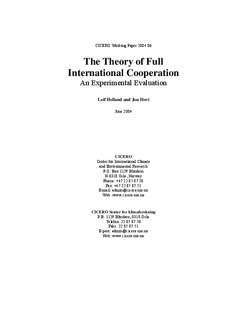| dc.contributor.author | Helland, Leif | nb_NO |
| dc.contributor.author | Hovi, Jon | nb_NO |
| dc.date.accessioned | 2014-03-17T14:31:22Z | |
| dc.date.available | 2014-03-17T14:31:22Z | |
| dc.date.issued | 2004 | nb_NO |
| dc.identifier.issn | 0504-452X | nb_NO |
| dc.identifier.uri | http://hdl.handle.net/11250/192318 | |
| dc.description.abstract | The concept of renegotiation-proof equilibrium has become a cornerstone in recent game theoretic reasoning about the stability of international environmental agreements. Applying this solution concept to a linear version of the infinitely repeated N-person Prisoners’ Dilemma, Scott Barrett has been able to derive a number of interesting (and sometimes provocative) predictions about international cooperation to curb climate change. This paper reports the results of a laboratory experiment designed to test two central predictions from Barrett’s model. The first prediction says that the higher the cost of making a contribution, the more cooperation will materialize. The second claims that the number of cooperators is independent of group size. The experiment was designed to replicate the assumptions of Barrett’s model closely. We find that the experimental confrontation lends very little support to the two predictions. | nb_NO |
| dc.language.iso | eng | nb_NO |
| dc.publisher | CICERO Center for International Climate and Environmental Research - Oslo | nb_NO |
| dc.relation.ispartof | CICERO Working Paper | nb_NO |
| dc.relation.ispartofseries | CICERO Working Paper;2004:06 | nb_NO |
| dc.title | The Theory of Full International Cooperation: An Experimental Evaluation | nb_NO |
| dc.type | Working paper | nb_NO |
| dc.source.pagenumber | 22 | nb_NO |
